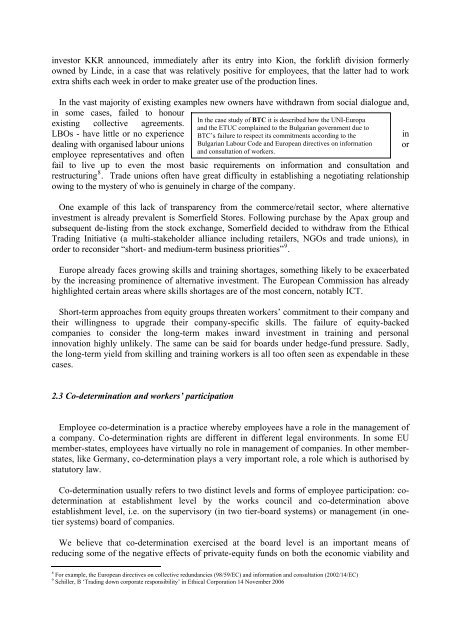Executive summary - Udo Bullmann
Executive summary - Udo Bullmann
Executive summary - Udo Bullmann
- No tags were found...
You also want an ePaper? Increase the reach of your titles
YUMPU automatically turns print PDFs into web optimized ePapers that Google loves.
investor KKR announced, immediately after its entry into Kion, the forklift division formerlyowned by Linde, in a case that was relatively positive for employees, that the latter had to workextra shifts each week in order to make greater use of the production lines.In the vast majority of existing examples new owners have withdrawn from social dialogue and,in some cases, failed to honourexisting collective agreements.LBOs - have little or no experienceinIn the case study of BTC it is described how the UNI-Europaand the ETUC complained to the Bulgarian government due toBTC’s failure to respect its commitments according to theBulgarian Labour Code and European directives on informationand consultation of workers.dealing with organised labour unionsoremployee representatives and oftenfail to live up to even the most basic requirements on information and consultation andrestructuring 8 . Trade unions often have great difficulty in establishing a negotiating relationshipowing to the mystery of who is genuinely in charge of the company.One example of this lack of transparency from the commerce/retail sector, where alternativeinvestment is already prevalent is Somerfield Stores. Following purchase by the Apax group andsubsequent de-listing from the stock exchange, Somerfield decided to withdraw from the EthicalTrading Initiative (a multi-stakeholder alliance including retailers, NGOs and trade unions), inorder to reconsider “short- and medium-term business priorities” 9 .Europe already faces growing skills and training shortages, something likely to be exacerbatedby the increasing prominence of alternative investment. The European Commission has alreadyhighlighted certain areas where skills shortages are of the most concern, notably ICT.Short-term approaches from equity groups threaten workers’ commitment to their company andtheir willingness to upgrade their company-specific skills. The failure of equity-backedcompanies to consider the long-term makes inward investment in training and personalinnovation highly unlikely. The same can be said for boards under hedge-fund pressure. Sadly,the long-term yield from skilling and training workers is all too often seen as expendable in thesecases.2.3 Co-determination and workers’ participationEmployee co-determination is a practice whereby employees have a role in the management ofa company. Co-determination rights are different in different legal environments. In some EUmember-states, employees have virtually no role in management of companies. In other memberstates,like Germany, co-determination plays a very important role, a role which is authorised bystatutory law.Co-determination usually refers to two distinct levels and forms of employee participation: codeterminationat establishment level by the works council and co-determination aboveestablishment level, i.e. on the supervisory (in two tier-board systems) or management (in onetiersystems) board of companies.We believe that co-determination exercised at the board level is an important means ofreducing some of the negative effects of private-equity funds on both the economic viability and8 For example, the European directives on collective redundancies (98/59/EC) and information and consultation (2002/14/EC)9 Schiller, B ‘Trading down corporate responsibility’ in Ethical Corporation 14 November 2006





